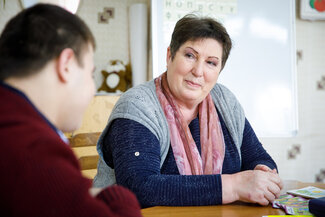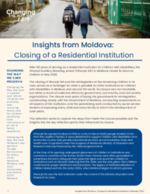
Background Information
Ms. Ala Derivolcova started her career as a music director in a kindergarten in the Republic of Moldova. Later in life she shifted roles and became a support teacher for children with disabilities or learning differences. The shift was seamless for her, as her focus always remained the same - a deep love and respect for children. “I loved children from the start,” Ala explains. “Because when you come and see their eyes…I mean, this profession became everything for me.” She understands her work with children with different needs is special. “…you realize that these kids probably need more kindness, love, and care than anyone else.” Ala’s relationship with the kids at her school is based on mutual respect. She respects their differences and focuses on their strengths.
In 2011 with the Government of the Republic of Moldova adopted the Program for the Development of Inclusive Education (2011 - 2020) and in 2014, an Inclusive Education Fund was set-up to support inclusive education resource centers and support teachers, like Ala. A report by Changing the Way We Care Moldova, Insights from Moldova:
Closing of a Residential Institution Support, cited findings from a series of Family Assessments of children placed in residential institutions. The Family Assessments found that one of the reasons for a child's placement in a residential institution related to the child's failure at school due to the lack of specialists in inclusive education.
Teachers, like Ala, are fundamental to the success of inclusive education. For the past seven years, Ala has worked to ensure that these children succeed in school – academically, socially, and emotionally. To Ala, the resource center she works in feels like a “home away from home” for the children. “They look forward to coming here, and I accompany them to classes whenever I can. I guess, what they find here is a kind of home-like atmosphere.” Though, Ala has found support in the school she works, she feels there is much work to be done in the community to accept children with differences. “We are still somewhat closed-minded about the children whose needs [are different].” It is the community’s indifference to these children she finds the most distressing. “These children are part of our society. We are all one society, and they are part of it, like everyone else.”
While Ala is grateful there is an inclusive education space in her school, she feels that much more should be done. “I find a bit disappointing is that further inclusion of these children does not really happen…I wish they could have a life like everyone else, as full members of the society.” Ala remains hopeful, “I think that the schooling, the inclusion of these children in the education process…is greatly beneficial. I mean, it’s a huge power.”
Where They Operate
Key Areas of Work
Languages Spoken
Practitioner Resources
After 60 years of serving as a residential institution for children with disabilities, the Hîncești Auxiliary Boarding school (SIA Hîncești) in Moldova closed its doors to children in May 2022. The closing of Hîncești SIA serves as a harbinger for what is possible for other institutions for children with disabilities in Moldova and around the world.

